In recent years, the concept of Ecotourism has gained significant traction as travelers increasingly seek to explore the beauty of nature while leaving a minimal footprint on the environment. This growing trend not only caters to a wide array of adventure-seekers but also emphasizes the importance of preserving the sites we cherish. As climate change continues to threaten our planet, ecotourism presents a unique opportunity to engage with nature responsibly and support sustainable practices that combat harmful emissions.
Understanding the interplay between ecotourism and the environment is crucial. Many ecotourism initiatives focus on promoting conservation efforts, educating visitors on local ecosystems, and engaging them in activities that foster a deeper connection with nature. For instance, trekking through a rainforest or snorkeling in a coral reef can illuminate the beauty and fragility of these environments. Yet, these experiences must be carefully managed to prevent over-tourism, which can lead to increased pollution and habitat destruction.
Moreover, ecotourism emphasizes the importance of supporting local communities. By promoting cultural heritage and encouraging travelers to purchase local goods and services, ecotourism can contribute to the economic stability of these areas. This approach not only enriches the travel experience but also aids in the preservation of local biodiversity and habitats, creating a win-win situation for both the environment and the community.
One of the most pressing challenges today is climate change, which poses a dire threat to natural wonders. The rise in global temperatures leads to melting glaciers, rising sea levels, and increased natural disasters, which can disrupt delicate ecosystems. By embracing ecotourism, travelers can advocate for practices that specifically aim to mitigate these effects. Many ecotourism operators are now focusing on reducing their carbon footprint through the use of renewable energy, waste management programs, and sustainable transportation options.
The emotional connection we feel toward nature drives our desire to explore, but it also brings a responsibility to protect it. When individuals become more aware of their environmental impact, they are more likely to make conscious choices that align with sustainable living. Whether it’s opting for eco-friendly accommodations, minimizing plastic usage, or participating in conservation programs during travel, every little action contributes to a collective effort against climate change.
Furthermore, the amount of carbon emissions generated from traditional tourism is staggering. Flights, cruises, and mass tourism contribute significantly to our carbon footprint, thus intensifying climate issues. In contrast, ecotourism offers alternatives that reduce these emissions. Many ecotourism destinations are accessible via eco-conscious transport, such as buses or bikes, allowing travelers to appreciate the journey as part of the experience while minimizing their environmental impact.
Ultimately, engaging in ecotourism not only satisfies our wanderlust but also empowers us to become stewards of the earth. By choosing to travel with a conscience, we can celebrate nature’s beauty while actively participating in its preservation. The adventures we seek can be transformative, offering not only personal enrichment but also supporting sustainable practices that are crucial for combating climate change.



